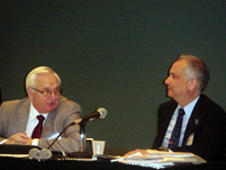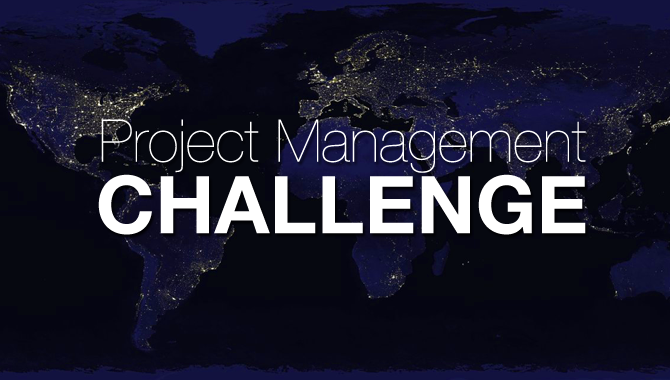February 28, 2011 Vol. 4, Issue 2
The second international forum at PM Challenge featured practitioners from eight space agencies as well as representatives from the global aerospace industry.
The necessity of international collaboration was a common theme among participants in the second annual international forum at PM Challenge. The sessions explored a wide range of topics related to collaboration, including global trends in project management as well as perspectives from the military, non-traditional partners, and young professionals.
Dr. Ed Hoffman, director of the NASA Academy of Program/Project & Engineering Leadership, kicked off the forum with an opening session that featured Mark Langley, Chief Executive Officer of the Project Management Institute (PMI); Chris Scolese, NASA Associate Administrator; and Mike O’Brien, NASA Associate Administrator, Office of International and Interagency Relations. O’Brien noted that the agency has 471 active international agreements, and that eight countries account for roughly half of those. NASA cooperates by necessity, according to O’Brien. “It (the work of NASA) can really only be done if we have a global network,” he said. Scolese emphasized that the benefits of collaboration are not always apparent at the outset of a project or mission. “These collaborations pay dividends in ways that we and the world never would expect,” he said.

Terry Cooke Davies, chairman of Human Systems, and Dr. Ed Hoffman, director of NASA’s Academy discuss trends in project management during the International Forum at the Project Management Challenge. Photo Credit: NASA APPEL
Hoffman also led a discussion of trends in project management. (See this month’s Message from the Director for an overview of his presentation.) Terry Cooke Davies, chairman of Human Systems (UK), suggested that NASA is moving toward what he called “project management 2.0,” which incorporates insights from neuroscience and psychology to offer a more comprehensive model of project management than the traditional focus on cost, schedule and performance. Mario Cardano of Thales Alenia discussed the growing pains associated with transitioning to new business models. “We are moving from a typical development environment to a service business,” he said. “It’s difficult.” Ruediger Seuss of the German Aerospace Center (DLR) provided an overview of his organization’s virtual project academy, noting that, “We have to bring a community together.”
Other highlights from the international forum included:
- Representatives from some of the active International Space Station (ISS) partner agencies, including Gilles Leclerc, Canadian Space Agency (CSA), Kuniaki Shiraki, Japanese Aerospace Exploration Agency (JAXA), and Bill Gerstenmaier, NASA Associate Administrator for Space Operations, reviewed their respective agencies’ plans for utilization of the station.
- Mike Freilich, Director of the Earth Science Division in NASA’s Science Mission Directorate, and Takashi Hamazaki of JAXA discussed the challenges of climate monitoring from space. Freilich pointed to the continuing tension between broadening the scope of climate-monitoring missions and achieving long-term continuity of key measurements. “No single country and no single agency can do it,” he said.
- Rudi Schmidt, Thomas Passvogel, and Alan Thirkettle (retired) of the European Space Agency (ESA) talked about working in the context of an agency that is wholly international, with 18 member states, 14 different languages, and seven currencies.
- Jan Kol of the Czech Space Office, Sias Mostert of Space Commercial Services (South Africa), and Luis Genovese of INVAP (Argentina) addressed issues in new and evolving space-faring nations.
- Takashi Hamazaki of JAXA, Joon-Min Choi of the Korea Aerospace Research Institute (KARI), and Kuniaki Shiraki, JAXA, discussed space project management challenges in Asia.
- Tom Burbage, Lockheed Martin Aeronautics executive vice president and F-35 program general manager, provided an overview of the challenges associated with developing the F-35 Joint Strike Fighter, which features eight primary international partners. “Nobody can afford to develop a new airplane by themselves,” he said. “Nobody has those kinds of resources anymore. It has to be done as a partnership.”
- Ed Hoffman of NASA, Takashi Hamazaki of JAXA, Joon-Min Choi of the Korea Aerospace Research Institute (KARI), and Ruediger Seuss (DLR) talked about the work of the International Project Management Committee.
- Gene Bounds of PMI, Carole Hedden of Aviation Week, Stacey Edgington, representing the International Astronautical Federation’s Workforce Development and Young Professionals Committee, and Agnieszka Lukaszczyk of the Space Generation Advisory Council offered perspectives on the challenges and opportunities for young professionals in the aerospace industry. (See the Young Professionals Brief for more about this session.)
View the presentations from the International Forum at PM Challenge.






